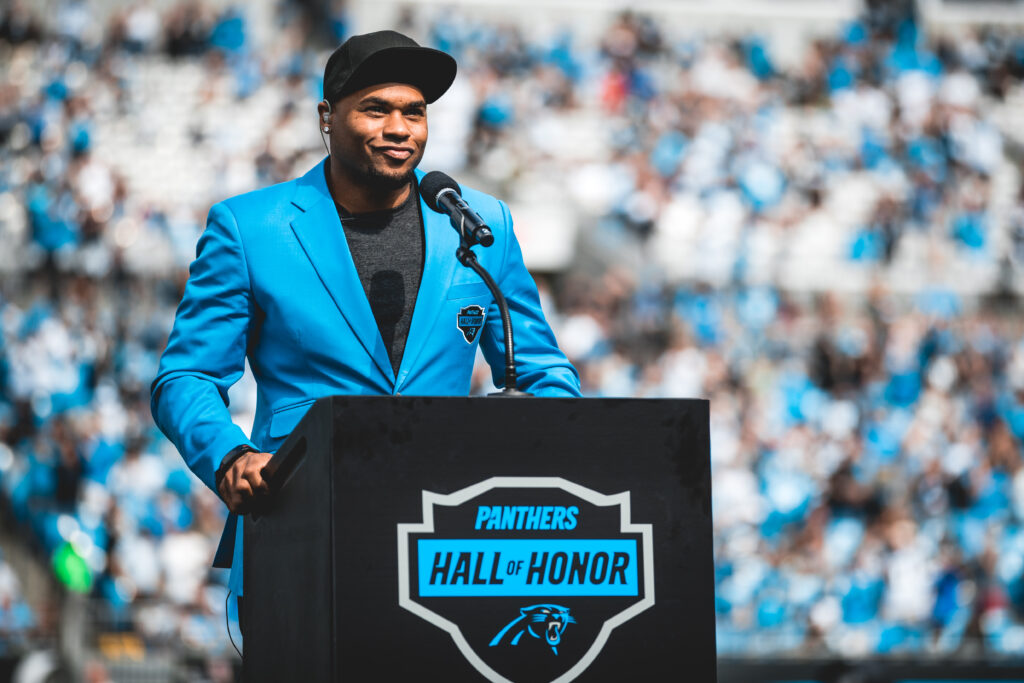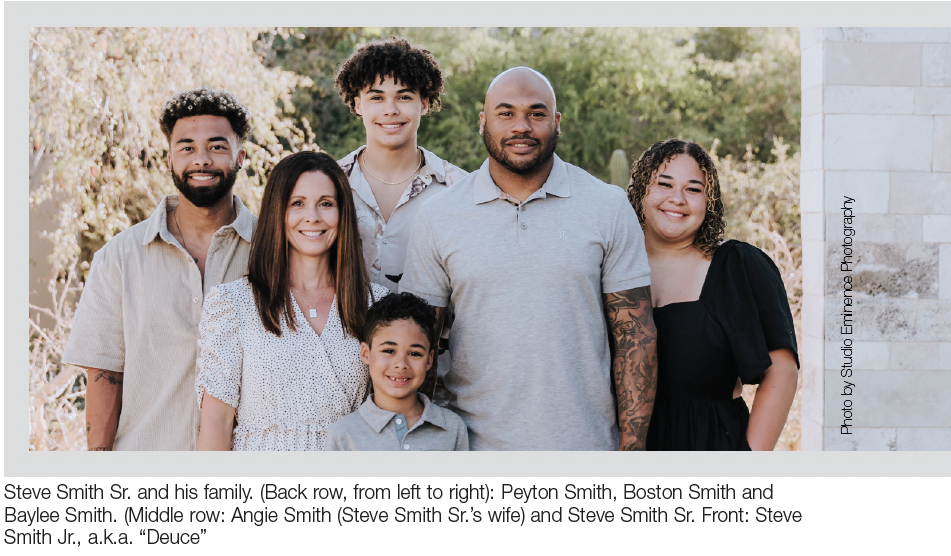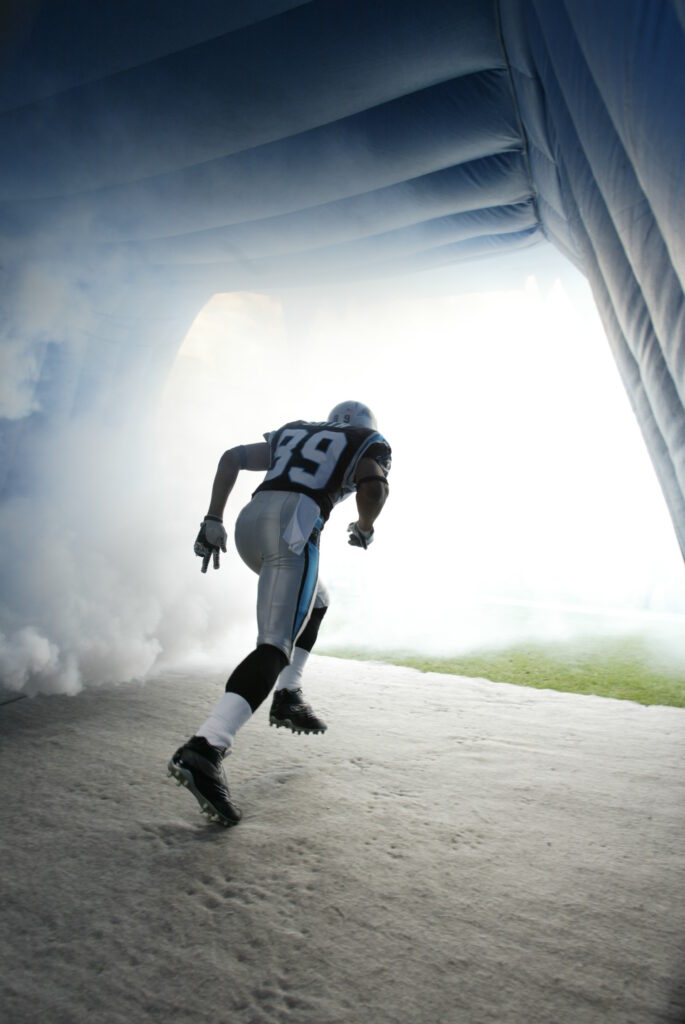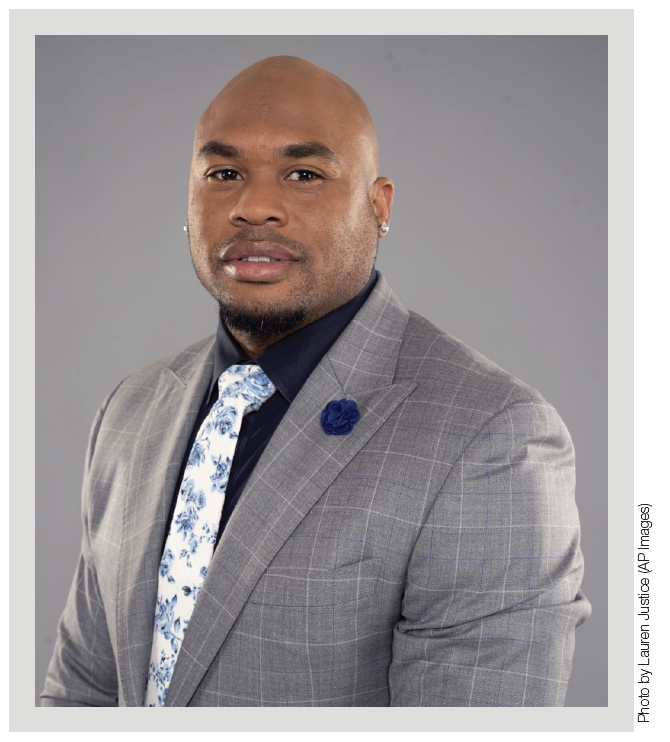By Angela Lindsay

Most people know Steve Smith Sr. as the scrappy, tough-as-nails wide receiver who played in the NFL for 16 years, including 13 years with the Carolina Panthers. Smith and his teammates valiantly battled the New England Patriots in the 2003 season Super Bowl match in which Smith, wearing number 89, made a spectacular 39-yard touchdown reception. Although the Panthers lost that game, 32–29, the team gave Panthers’ fans great excitement and something to be proud of that year.
Even then, when Smith wasn’t dazzling fans with spectacular catches and swift sprints into the end zone, he was busy, passionately building a legacy off the field in the community.
Steve Smith Family Foundation
Smith initially created the Steve Smith Family Foundation to focus on the awareness and prevention of domestic violence and the health, wellness and needs of underserved families and communities.
Many of the services and programs the foundation offers are based on childhood experiences Smith had growing up in an underserved Los Angeles community with a “hard-working” single mother who was a survivor of domestic violence (not by his biological father), said Smith. He began to realize how the government assistance his family received, and the public resources and services they otherwise lacked, impacted him overall.
June 2023 will mark the 10th anniversary of the foundation which now consists of a medical clinic,
mental health facility and an afterschool program, all of which are “really servicing the full body of our community,” he said. Smith hired an agency to run the foundation which was private for a long time. “Because of my name and being a professional athlete, I had to prove that my foundation was legitimate, and that we are doing things that really impact and help the community. I feel like, at times, I had to go the extra step that other people didn’t have to . . .” he explains, adding that some people questioned whether they should give to the foundation because of his wealth. However, being personally and financially invested was never a question for him, he added. He wanted to see the same commitment from the local community.
“If it takes a village to raise a child, how many people does it take to raise several children? It takes a community.”
Smith personally gave about 85 percent of all donations to the foundation in the beginning and learned a lot over time from working with other foundations in the area, including the challenge of balancing home life, professional responsibilities and taking personal time for himself.
“When there is a lived experience, how you come to work, how you come to that foundation, how you impact it, how you want to leave your imprint — you just come with a different energy, and your focus is different because you understand what’s on the other side of what some of these families are going through when they’re in these situations,” Smith shared.

The foundation’s medical clinic provides medical services for the uninsured and those who didn’t have the money or insurance to pay. Smith recalls that as a child his family did not always have insurance or a primary care doctor for regular checkups. So they would go to the emergency room instead, adding that they often had to choose between medical, utilities or food.
“I think those are basic necessities that you shouldn’t have to really ask yourself if I have to take myself or my child to the doctor or hospital to receive just an annual check-up or something
going on, Smith said.
The medical space on Central Avenue is currently being renovated to become an urgent care for only the uninsured and will reopen in 2023.
The foundation also offers an after-school program. “[When the covid pandemic started], we rented out a 10,000 square foot office space, and we had about 108 kids there. I hired about 14 teacher assistants that were let go during covid that didn’t have jobs, ” he said.
The program served the children breakfast and lunch. The school transported the children to school and back home. They were socially distanced and “loved on,” said Smith. He shared that during the height of the covid pandemic, his own children who had all the resources they needed, still struggled.
“If we had all the resources, and our kids were struggling, what about the other kids who didn’t have all the resources? They had to be struggling, too.”
The afterschool program also serviced children experiencing homelessness, Smith said. Some were living in shelters and had nowhere to go because they had to vacate the shelters during the day.
The Steve Smith Family Foundation is also partnering with Mecklenburg County, Alliance Health and Daymark Recovery Services to open a Behavioral Health Urgent Care (BHUC) facility this year.. The goal of BHUC is to provide a community-based option to stabilize individuals experiencing behavioral health crises in a way that reduces unnecessary trips to the emergency room, hospitalizations and incarcerations. It will operate 24 hours a day, 7 days a week. The BHUC will also work with law enforcement to create better protocols and programs to approach mental with a healthy versus “skewed” perspective, Smith said. Living in Charlotte for nearly 20 years now with his wife, Angie Smith, with whom he has four children, Smith said he has formed many relationships here and wants to give back to a city that gave so much to him in the early years of his career by helping him mature as a young man and a businessman. After all, he grew into an adult here — right along with a city that was finding its own identity at the time. He learned a lot and made some mistakes during his transition from football player to foundation founder, he said.

“The one thing I will say is that when you know how the sausage is made, it can leave a bad taste in your mouth,” he said. “It’s tough to make decisions that are less emotional and more data-driven.”
The football life
Although he grew as a San Francisco 49ers fan and would have loved to play in Candlestick Park (now demolished), Smith is grateful to have been drafted by the Panthers in the 3rd round of the 2001 NFL draft.
“I played in an all-star game in Alabama, but that was the furthest I’d ever traveled on an airplane. So, I didn’t know where North Carolina was. I didn’t know how far it was.” ”
Smith didn’t know what he should be excited or disappointed about and just had to “take it all in.” One thing that was certain, after playing Pop Warner and high school football teams, he said he felt, for him, it was the NFL or bust. “I always had a desire to play in the NFL. There was no plan B,” he said.
Smith first attended Santa Monica College where he was spotted by University of Utah recruiters who were there to look at another receiver — and Utah offered him a scholarship.
“I got the opportunity to go to school for free. My parents couldn’t afford to send me to school, especially out of state. Going to school away from community college or a state school in Los Angeles — it was my chance. I got the opportunity and tried to take full advantage of it.”
And that he did. Smith is a five-time Pro Bowl selection, a Carolina Panthers Hall of Honor inductee, a Class of 2022 Pro Football Hall of Fame semi-finalist and the Panthers’ all-time leader in receiving yards.
His family and free time
Despite this success, Smith has taught his children a different kind of lesson. “One of the biggest things I’ve done in my football career that I make sure and emphasize is, my kids don’t have to run, jump, catch, flip — they don’t have to play sports to go to college. So, they can focus on academics. Academics in our home is first. Sports are second.”
The Smithseldest son, Peyton, graduated from Wofford College where he played soccer; son Boston is being recruited to play basketball by several schools; daughter Baylee attends cosmetology school; and their youngest child, Steve Smith Jr. (Deuce), is still in grade school.
As a permanent seat license owner of the Charlotte Football Club, Smith enjoys attending Major League Soccer games with his family. As an NFL analyst, Smith said he can’t always watch those games as a true fan. But with soccer, he said, “It’s one of the few times I can be in the stadium, and it’s not about me. It’s actually about soccer and just being a fan.”



